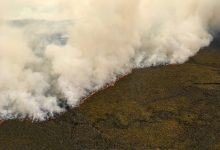As broad areas of New South Wales and Queensland experience an unprecedented early start to the bushfire season, a new report has shown a record number of Australians now link climate change to an increased rate and severity of natural disasters, including extended droughts.
The Australia Institute’s Climate of the Nation 2019 report, published on Tuesday, found that more than three quarters of Australians (77%) agree that climate change is occurring, the equal highest number ever recorded (tied with 2016), since the annual survey began in 2007.
Concern about the impacts of climate change has also increased across the board, with 81 per cent naming their biggest climate concerns as droughts and flooding that would affect crops and food supply (81%), animal and plant extinction (78%), and water shortages in cities (78%).
Another 80 per cent of respondents to the poll taken in the last week of July agreed that Australians were already experiencing the impacts of climate change, which nearly half of those surveyed (48%) saying it was causing more extreme heat.
The TAI report also showed that more Australians also agree that one of the best ways to mitigate the severity of climate change is to phase out coal-fired power, with 70 per cent supporting a plan for orderly coal plant closure and replacement with clean energy.
This is true even in Queensland, where 73 per cent of respondents agreed that coal fired power stations should be phased out either as soon as possible (24%) or gradually (49%).
“Climate change is driving economic policy, diplomacy and politics in Australia. That is why this benchmark report is more important than ever in 2019,” said Richie Merzian, TAI’s climate and energy director.
“The results from Climate of the Nation make it clear that Australians are increasingly concerned about climate change impacts happening right now and the lack of preparation or support to address them.
“Australians are well aware of what is required, and see addressing climate change as a multi-partisan issue that ought to be above politics.”
Indeed, the result reveals an increasing disconnect between the climate-lite policies of the federal Coalition government – and the outright climate-denying of the LNP’s far right rump – and the voters of Australia.
And it shows that Australians overwhelmingly are coming down on the side of science on the subject of climate change, and not the mainstream media which continues to present the topic as if it were undecided, and up for debate.
This is the same mainstream media this week celebrating the legal victory of climate sceptic physics professor Peter Ridd, who was last week awarded $1.2 million in damages for what a Federal Court judge ruled was his unlawful dismissal by James Cook University.
Ridd – as a triumphant 2GB Radio report frames it – was sacked in 2017 by JCU for questioning global warming’s impact on the Great Barrier Reef. From the point of view of the University, however, it was for repeatedly questioning colleagues’ research on the impact of global warming on the Great Barrier Reef, which he criticised as untrustworthy and “misleading”.
Ridd sought compensation via the court, arguing that the controversy surrounding his sacking had put an end to his academic career – even if, at the same time, it had elevated his status and currency in Conservative media circles.
“In terms of the companies that want to hire scientists, all the fame and being on the Australian [newspaper] or on the IPA doesn’t help one iota,” he told the Court.
“I think it’s bad. I mean, maybe that will produce a different career outcome but in terms of these sort of things most big institutions don’t want a bar of somebody who has been through my sort of controversy.”
James Cook University has announced it will appeal the Federal Court decision.










